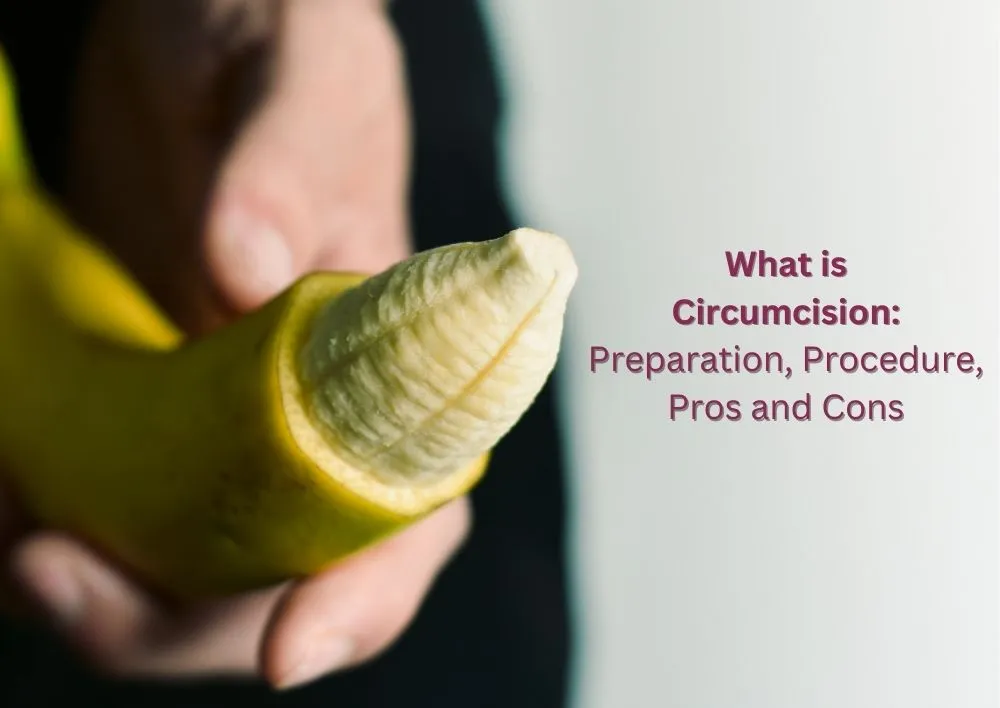What is Circumcision: Preparation, Procedure and Pros & Cons
Circumcision is a surgical procedure that involves the removal of the foreskin from the penis. It is a fold of skin that covers the tip of the penis. In various societies around the globe, circumcision surgery has cultural, religious, and medical importance. This practice has been performed for centuries. Circumcision is not limited to babies; older boys and men also undergo the procedure. As per the National Family Health Survey (NFHS-4), the overall circumcision rate in India stands at 16%.
Making the right choice of a surgeon for a smooth and comfortable circumcision is an important decision. Miracles Apollo Cradle/Spectra, renowned as the leading hospital for stapler circumcision surgery in Gurgaon, offers advanced procedures. Our board-certified team of general surgeons/urologists in Gurgaon has successfully performed countless stapler circumcisions, employing an advanced stapler technique that ensures precise incisions, minimal bleeding, faster healing, and fewer complications.
Feel free to call us and schedule an appointment with our experts (Dr. Anubhav Sangwan)for a stress-free stapler circumcision procedure.
In this blog post, we will delve into the details of circumcision, covering its preparation and procedure, and carefully assess the pros and cons associated with this surgical intervention.
What is Circumcision?
Circumcision is a surgical procedure designed to remove the foreskin, commonly performed on newborn boys for religious and cultural reasons. However, it is not exclusive to infants; older boys and men also undergo circumcision for its medical benefits, including a reduced risk of urinary tract infections and sexually transmitted infections.
Understanding the Foreskin:
The foreskin is a loose fold of skin naturally covering the tip of the penis. This anatomical feature plays a crucial role in protecting the sensitive head of the penis from irritation, aids in lubrication during sexual activities, and contributes to overall sexual pleasure.
When Should Circumcision Be Done?
Circumcision is a surgical procedure that is often carried out within the first few days of life. Ideally, it is recommended to be performed within the first 48 hours after birth for several compelling reasons:
-
Reduced Pain in Newborns: Newborns experience less pain compared to older children, making the procedure less traumatic at this early stage of life.
-
Faster Recovery in Newborns: The nervous systems of newborns are not fully developed, facilitating a quicker recovery process compared to older individuals.
-
Ease of Procedure on a Smaller Penis: Performing circumcision on a smaller penis is relatively easier due to less tissue removal, minimizing the complexity of the procedure.
However, circumcisions can also be performed at later ages for various reasons:
-
Religious Traditions: In certain religions such as Judaism and Islam, circumcision is considered a fundamental ritual and is traditionally performed on the 8th day of life.
-
Medical Reasons: Circumcision may be conducted in later childhood or adulthood due to medical conditions necessitating the procedure for the individual's well-being.
-
Personal Choice: In some families, circumcision is chosen as a matter of personal preference and is performed at a young age.
Understanding the optimal timing for circumcision involves considering a combination of factors, including cultural, religious, medical, and individual choices. It is crucial to consult with a circumcision surgery specialist to make informed decisions based on specific circumstances.
Why is Circumcision Done?
circumcision is a surgical procedure performed for a variety of reasons, reflecting cultural, religious, medical, and personal considerations:
Religious and Cultural Reasons:
-
Judaism and Islam: Circumcision surgery is a significant religious ritual in both Judaism and Islam, often performed on male infants as a commitment to religious beliefs and a promise to God.
-
African and Oceanic Cultures: In certain African and Oceanic cultures, circumcision is a traditional practice, believed to promote hygiene and masculinity.
Medical Reasons:
-
Hygiene: Circumcision is advocated for newborns as the foreskin can be challenging to retract and clean, contributing to improved genital hygiene.
-
Medical Conditions: In specific cases, circumcision becomes medically necessary to address conditions such as tight foreskin or inflammation of the glans penis.
-
Reduced Infection Risk: Circumcision is associated with a decreased risk of urinary tract infections (UTIs) in infants and sexually transmitted infections (STIs) in adulthood.
Personal Reasons:
-
Family Tradition: Some families opt for circumcision based on long-standing family traditions, viewing it as a cultural practice.
-
Aesthetics: In regions where circumcision rates are high, some males may choose the procedure for aesthetic reasons, aligning with local cultural norms.
Circumcision, being a multifaceted practice, reflects a range of beliefs and considerations. Whether driven by religious devotion, cultural practices, medical necessities, or personal choices, the decision to undergo circumcision is deeply rooted in individual and familial perspectives. Understanding these varied motivations can contribute to a more informed discourse surrounding the practice.
How to Prepare for Circumcision?
Preparation for circumcision is an important step, and the approach varies based on factors such as age and the specific technique used. Here are detailed preparations for both newborns and older individuals:
For Newborns:
-
Health Discussion: Start a detailed discussion with the doctor regarding your baby's overall health, potential medical conditions, and any medications they are currently taking.
-
Topical Anesthetic Application: The doctor may apply a topical anesthetic cream to the baby's penis several hours before the procedure, ensuring a more comfortable experience.
-
Comfortable Attire: Prepare loose-fitting diapers and comfortable clothing for the baby to wear post-procedure, promoting ease and minimizing discomfort.
For Older Children and Adults:
-
Consultation with a Healthcare Professional: Schedule an online consultation with your doctor or urologist to discuss the circumcision procedure and available anesthesia options tailored to your specific needs.
-
Medical Information: Inform the doctor about any existing medical conditions and medications you are currently taking, facilitating a thorough understanding of your health.
-
Medication Adjustment: If required, your doctor may advise you to stop certain medications, especially blood thinners, before the procedure to reduce the risk of bleeding.
-
Allergy Information: Share information about any allergies with your doctor to ensure appropriate precautions are taken.
-
Clothing Choice: Prepare loose-fitting clothing to improve postoperative comfort and support healing.
-
Hygiene Practices: Maintain good hygiene by showering the day before the procedure, reducing the risk of infection.
-
Avoid Shaving: Refrain from shaving the genital area, minimizing the potential for skin irritation.
-
Avoid Harsh Soaps or Lotions: Avoid harsh soaps or lotions that may irritate the skin in the genital region.
-
Light Meal and Hydration: Consume a light meal and ensure proper hydration before the procedure, promoting overall well-being.
By carefully following these preparation guidelines, individuals can contribute to a smoother and more comfortable circumcision experience, irrespective of age. Always consult with healthcare professionals to receive personalized advice based on individual health considerations.
How is Circumcision Done?
Circumcision is a surgical procedure that involves several key steps, ensuring precision and care throughout the process:
-
Anesthesia Administration: Depending on the age and preferences of the individual, physicians will administer either general, local, or topical anesthesia.
-
Penis Sterilization: The surgeon begins by thoroughly cleaning and sterilizing the penis using an antiseptic solution. This important step minimizes the risk of infection during and after the surgery.
-
Measurement: To determine the amount of foreskin to be removed, the surgeon carefully measures the size and circumference of the penis. This step is important for achieving precision in the procedure.
-
Foreskin Separation: Utilizing a special surgical device, the surgeon carefully separates the foreskin from the head of the penis. This process is conducted with precision to avoid any damage or discomfort.
-
Foreskin Removal: Following the separation, a scalpel is employed to remove the foreskin. The surgeon ensures accurate and controlled incisions, aiming for a smooth and efficient procedure.
The procedure is conducted with a focus on minimizing discomfort, ensuring sterility, and achieving precise results. The choice of anesthesia, meticulous sterilization, accurate measurements, and the use of specialized surgical tools collectively contribute to a successful and well-executed circumcision. It is important to consult with healthcare professionals for personalized guidance and information tailored to individual circumstances.
Pros or Potential Benefits of Circumcision:
Circumcision is considered a safe procedure and offers several potential benefits, including:
-
Reduced Infection Risk: Circumcision may lower the risk of urinary tract infections in infants and decrease the likelihood of sexually transmitted infections (STIs) in adults.
-
Improved Genital Hygiene: The removal of the foreskin can contribute to improved genital hygiene, especially in newborns, where cleaning may be challenging.
-
Treatment of Penile Disorders: Circumcision has been found beneficial in treating specific penile disorders such as balanoposthitis, paraphimosis, and phimosis.
-
Cons or Potential Drawbacks of Circumcision: While circumcision has potential benefits, it is important to consider the potential drawbacks:
-
Pain and Discomfort: The procedure can cause discomfort, especially for older children and adults who may experience more significant sensitivity.
-
Risk of Complications: As with any surgical intervention, there is a small risk of complications, including bleeding, infection, and reactions to anesthesia.
-
Improper Cutting: Improper cutting of the foreskin, either too long or too short, can lead to complications and impact the desired outcome of the procedure.
-
Irritation on the Tip of the Penis: Some individuals may experience irritation on the tip of the penis post-circumcision, which can be a potential drawback.
Individuals and parents need to weigh these pros and cons carefully, considering both potential benefits and risks, before deciding on circumcision. Consulting with healthcare professionals can provide personalized guidance based on individual circumstances and preferences.
How Long Does it Take to Recover From Circumcision?
Recovery from circumcision varies depending on various factors, including age and the specific techniques employed during the procedure. Generally, the recovery period spans approximately 8 to 10 days.
During this recovery phase:
-
Newborns: Newborns typically experience a faster recovery due to their less developed nervous systems and smaller surgical areas.
-
Older Children and Adults: Older individuals may require a slightly longer recovery period due to increased sensitivity and a more developed nervous system.
Recovery Guidelines:
Regardless of age, following these guidelines may contribute to a smoother recovery:
-
Rest and Avoidance of Strenuous Activities: Engage in adequate rest and avoid strenuous activities during the initial days to promote healing.
-
Proper Hygiene Practices: Maintain proper hygiene to minimize the risk of infection. Follow any postoperative care instructions provided by healthcare professionals.
-
Pain Management: Manage any discomfort with prescribed or over-the-counter pain medications as your healthcare provider advises.
-
Loose-Fitting Clothing: Wear loose-fitting clothing to reduce friction and promote comfort during the recovery period.
-
Avoidance of Irritants: Refrain from using harsh soaps or lotions in the genital area to prevent irritation.
-
Scheduled Follow-up Appointments: Attend scheduled follow-up appointments with healthcare professionals to ensure proper healing and address any concerns.
Individual recovery experiences may vary. Any persistent pain, swelling, or signs of infection should be promptly reported to healthcare providers for further assessment and guidance. Always follow the postoperative care instructions provided by your healthcare team to optimize the recovery process.
Conclusion:
Circumcision is a surgical procedure interlinked with several cultural, religious, and medical considerations. Before deciding to undergo the procedure, it is important to thoroughly consider the complexities of the process, potential benefits, and associated risks. Making an informed decision ensures a thorough understanding of the importance and contributes to a more thoughtful approach to this meaningful personal choice.
Miracles Healthcare, a leading general surgery hospital in Gurgaon, specializes in stapler circumcision surgery, a procedure that combines cutting-edge expertise with personalized care. Our team comprises the best circumcision surgery doctors in Gurgaon, known for their extensive experience in performing stapler circumcisions.
We prioritize a patient-centric approach to alleviate any anxieties you may have. Our state-of-the-art facilities are equipped with advanced technology and tools, ensuring a precise and efficient procedure with minimal discomfort. Post-surgery, we offer complete follow-up care to guide you through a comfortable and speedy recovery, minimizing disruption to your daily life.
Miracles Healthcare provides comprehensive healthcare services through several facilities, including Miracles Apollo Cradle, Miracles Apollo Cradle/Spectra, Miracles Fertility & IVF Clinic, and Miracles Mediclinic. Our facilities are strategically located in Sec 14, Sec 56, and Sec 82, ensuring convenient access to daily healthcare services for the residents of Gurgaon.
Seeking circumcision surgery? Consult the best general surgery doctor near you at Miracles Healthcare for world-class care.
Frequently Asked Questions
Circumcision is performed under local or general anesthesia, so there is minimal pain during the procedure. However, mild discomfort, swelling, or sensitivity may be experienced during the healing process, which can be managed with pain relievers and proper aftercare.
No, circumcision does not increase the size of the penis. It only involves the removal of the foreskin and does not affect penile length or girth. However, it may create an illusion of a slightly longer appearance due to the exposed glans.
Yes, circumcision can be performed at any age, from infancy to adulthood. However, recovery may take longer in adults compared to infants, and the procedure might require different techniques depending on the patient's age.
No, circumcision does not occur naturally. It is a surgical procedure that involves the intentional removal of the foreskin. However, in rare cases, conditions like foreskin retraction or scarring may mimic a circumcised appearance.
Yes, circumcision can help cure recurrent balanitis (inflammation of the glans) by removing the foreskin, which reduces the risk of infections and improves hygiene. However, mild cases of balanitis can often be treated with medications before considering circumcision.















Was the information useful?
0 0